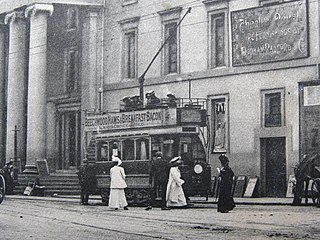
Donoghue v Stevenson[1932] UKHL 100 was a landmark court decision in Scots delict law and English tort law by the House of Lords. It laid the foundation of the modern law of negligence, establishing general principles of the duty of care.

Hedley Byrne & Co Ltd v Heller & Partners Ltd [1964] AC 465 is an English tort law case on economic loss in English tort law resulting from a negligent misstatement. Prior to the decision, the notion that a party may owe another a duty of care for statements made in reliance had been rejected, with the only remedy for such losses being in contract law. The House of Lords overruled the previous position, in recognising liability for pure economic loss not arising from a contractual relationship, applying to commercial negligence the principle of "assumption of responsibility".
In common law jurisdictions, a misrepresentation is an untrue or misleading statement of fact made during negotiations by one party to another, the statement then inducing that other party to enter into a contract. The misled party may normally rescind the contract, and sometimes may be awarded damages as well.

Bolam v Friern Hospital Management Committee [1957] 1 WLR 582 is an English tort law case that lays down the typical rule for assessing the appropriate standard of reasonable care in negligence cases involving skilled professionals such as doctors. This rule is known as the Bolam test, and states that if a doctor reaches the standard of a responsible body of medical opinion, they are not negligent. Bolam was rejected in the 2015 Supreme Court decision of Montgomery v Lanarkshire Health Board.

Caparo Industries PLC v Dickman[1990] UKHL 2 is a leading English tort law case on the test for a duty of care. The House of Lords, following the Court of Appeal, set out a "three-fold test". In order for a duty of care to arise in negligence:

Derry v Peek [1889] UKHL 1 is a case on English contract law, fraudulent misstatement, and the tort of deceit.
In the English law of tort, professional negligence is a subset of the general rules on negligence to cover the situation in which the defendant has represented him or herself as having more than average skills and abilities. The usual rules rely on establishing that a duty of care is owed by the defendant to the claimant, and that the defendant is in breach of that duty. The standard test of breach is whether the defendant has matched the abilities of a reasonable person. But, by virtue of the services they offer and supply, professional people hold themselves out as having more than average abilities. This specialised set of rules determines the standards against which to measure the legal quality of the services actually delivered by those who claim to be among the best in their fields of expertise.
In English tort law, an individual may owe a duty of care to another, to ensure that they do not suffer any unreasonable harm or loss. If such a duty is found to be breached, a legal liability is imposed upon the tortfeasor to compensate the victim for any losses they incur. The idea of individuals owing strangers a duty of care – where beforehand such duties were only found from contractual arrangements – developed at common law, throughout the 20th century. The doctrine was significantly developed in the case of Donoghue v Stevenson, where a woman succeeded in establishing a manufacturer of ginger beer owed her a duty of care, where it had been negligently produced. Following this, the duty concept has expanded into a coherent judicial test, which must be satisfied in order to claim in negligence.
Economic loss is a term of art which refers to financial loss and damage suffered by a person which is seen only on a balance sheet and not as physical injury to person or property. There is a fundamental distinction between pure economic loss and consequential economic loss, as pure economic loss occurs independent of any physical damage to the person or property of the victim. It has also been suggested that this tort should be called "commercial loss" as injuries to person or property can be regarded as "economic".
Recovery for pure economic loss in English law, arising from negligence, has traditionally been limited. Notably, recovery for losses that are "purely economic" arise under the Fatal Accidents Act 1976; and for negligent misstatements, as stated in Hedley Byrne v. Heller. Economic loss generally refers to financial detriment that can be seen on a balance sheet but not physically. Economic loss is then divided into "consequential economic loss" - that which arises directly from some physical damage or injury and "pure economic loss", which is everything else.
The tort of deceit is a type of legal injury that occurs when a person intentionally and knowingly deceives another person into an action that damages them. Specifically, deceit requires that the tortfeasor
Bristol and West Building Society v Mothew [1996] EWCA Civ 533 is a leading English fiduciary law and professional negligence case, concerning a solicitor's duty of care and skill, and the nature of fiduciary duties. The case is globally cited for its definition of a fiduciary and the circumstances in which a fiduciary relationship arises.

Smith v Eric S Bush [1990] UKHL 1 is an English tort law and contract law case, heard by the House of Lords. First, it concerned the existence of a duty of care in tort for negligent misstatements, not made directly to someone relying on the statement. Second, it concerned the reasonableness of a term excluding liability under the Unfair Contract Terms Act 1977, s 2(2) and s 11.

Candler v Crane, Christmas & Co [1951] 2 KB 164 is an English tort law case on negligent misstatement.

Henderson v Merrett Syndicates Ltd [1994] UKHL 5 was a landmark House of Lords case. It established the possibility of concurrent liability in both tort and contract.

Williams v Natural Life Health Foods Ltd[1998] UKHL 17 is an important English tort law, company law and contract law case. It held that for there to be an effective assumption of responsibility, there must be some direct or indirect conveyance that a director had done so, and that a claimant had relied on the information. Otherwise only a company itself, as a separate legal person, would be liable for negligent information.

Esso Petroleum Co Ltd v Mardon [1976] EWCA Civ 4 is an English contract law case, concerning misrepresentation. It holds that the divide between a statement of opinion and fact becomes more factual if one holds himself out as having expert knowledge.

Trevor Ivory Ltd v Anderson is one of the leading New Zealand cases regarding the personal liability of company directors. The case concerns the personal liability of a director of a one-man company for negligent misstatement and applied the principle of Tesco Supermarkets Ltd v Nattrass that where a director is the "directing mind" of a company, his actions are legally those of the company. The application of the case by New Zealand courts during the leaky homes crisis has been described as a "barrier to litigants recovering from directors of these companies".

Spring v Guardian Assurance plc[1994] UKHL 7, [1995] 2 AC 296 is a UK labour law and English tort law case, concerning the duty to provide accurate information when writing an employee reference.

Walsh v Jones Lang Lasalle Ltd [2017] IESC 38, is a decision of the Irish Supreme Court in which the court held that a purchaser bears the risk of reliance on erroneous information unless the vendor has clearly assumed responsibility for its accuracy. In reaching this decision, the court clarified the law in Ireland "in relation to the effect of statements disclaiming liability in actions claiming negligent misstatement."










